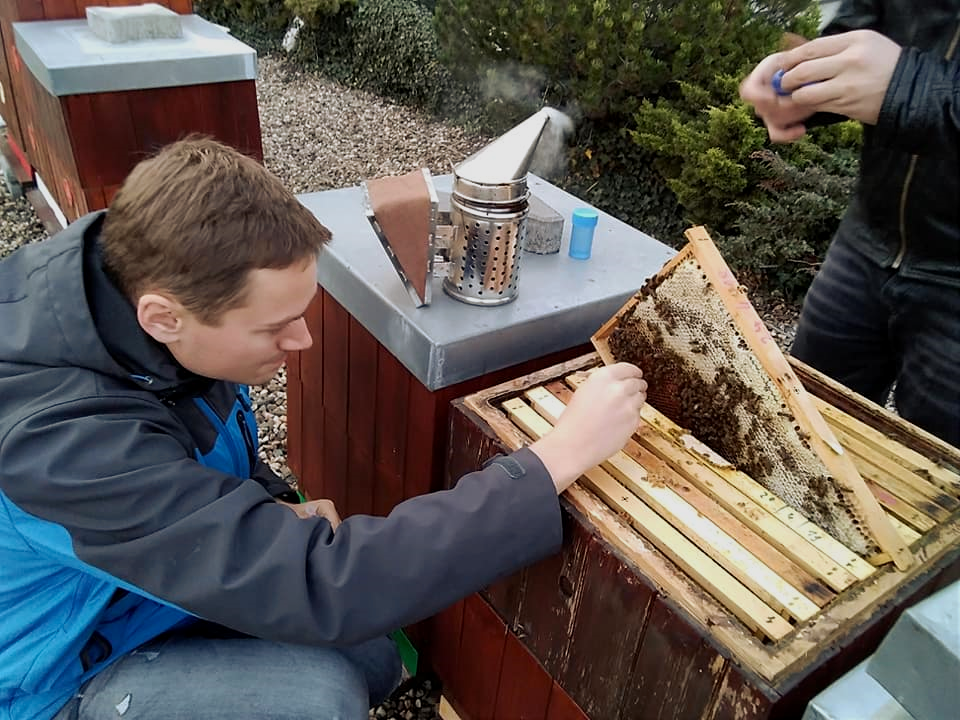
Prodělalová J., Čukanová E., Moutelíková R., Danihlík J. Výskyt včelích viróz v České Republice v roce 2021: Včelaření s viry. The occurrence of honeybee viruses at the Czech Republic in 2021: Beekeeping with viruses. Veterinářství 2022;72(6):348-351.
SOUHRN
Roztoč kleštík včelí (Varroa destructor) a virové nákazy se řadí mezi nejzávažnější faktory negativně ovlivňující zdraví včelstev (Apis mellifera). Včelích viróz bylo popsáno do dnešní doby několik desítek, přičemž mezi nejvíce sledované patří virus deformovaných křídel (DWV), virus černání matečníků (BQCV), virus pytlíčkovitosti plodu (SBV), virus akutní a chronické paralýzy (ABPV, CBPV). V tomto výzkumu jsme se zaměřili na sledování výskytu včelích viróz u českých včelařů. Vzorky byly získány od včelařů účastnících se občansko-vědního projektu COLOSS: Monitoring úspěšnosti zimování včelstev v roce 2021. Celkem byly získány vzorky z 2–3 včelstev od 46 chovatelů z 36 okresů ČR. U všech testovaných včelstev byla technikou reverzně transkripční-polymerázové řetězové reakce (RT-PCR) zjištěna přítomnost DWV a SBV, drtivá většina vzorků (97,8 %) byla také pozitivní na BQCV a z 81,9 % byl zastoupen i ABPV. Nejméně se vyskytující byl CBPV, který byl identifikován jen v 26,1 % včelstev. Viry byly přítomny v různých kombinacích, přičemž ve vzorcích od 7 chovatelů byla zjištěna přítomnost všech sledovaných virů. Pro úspěšné včelaření bez negativního vlivu viróz je potřeba dodržovat zásady prevence a léčby varroózy, správné chovatelské praxe a pak i dbát na výběr stanoviště s dostatkem potravních zdrojů.*
SUMMARY
The mite (Varroa destructor) and viral infections are among the most severe factors adversely affecting the health of bee colonies (Apis mellifera). Dozens of bee viruses have been described to date, with deformed wing viruses (DWV), black queen cell virus (BQCV), sack brood virus (SBV), and acute and chronic paralysis virus (ABPV, CBPV) being the most monitored. In this research, we focused on monitoring the occurrence of bee viruses in Czech beekeepers. Samples were obtained from beekeepers participating in the citizen-science project COLOSS: Monitoring colony losses in 2021. In total, samples were obtained from 2-3 beehives from 46 beekeepers from 36 districts of the Czech Republic. DWV and SBV were detected in all tested colonies by the reverse transcription -polymerase chain reaction (RT-PCR) technique. The vast majority of samples (97.8%) were also positive for BQCV. ABPV was also represented in 81.9%. The least common was CBPV, which was identified in only 26.1% of hives. The viruses were present in various combinations; in the case of 7 beekeepers, the presence of all viruses was recorded in their colonies. For successful beekeeping without the negative impact of viruses, it is necessary to follow the principles of prevention and treatment of varroosis, good beekeeping practices and also pay attention to the selection of habitats for apiaries with sufficient food resources.